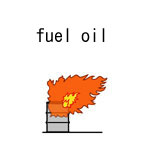| Case Name |
Leakage and fire of fuel oil caused due to reuse of an old gasket at a diesel power generator |
| Pictograph |

|
| Date |
October 13, 1989 |
| Place |
Ube, Yamaguchi, Japan |
| Location |
Office building |
| Overview |
On August 24th, 1989. Repairs of a fuel pump were performed for a private diesel-power generator at an office for rent. About two months later, on October 13th, fuel oil leaked from a flange of piping where an overhaul was carried out, and it was ignited by a high temperature of a diesel exhaust pipe. Reuse of a removed gasket is regarded as the cause. |
| Incident |
In a private power generator room of an office for rent, fuel leaked from the flange of a fuel feed pump during usual operation of two diesel generators. Fuel was ignited by a high temperature of an exhaust pipe, and there was a fire. |
| Processing |
Consumption and usage |
| Substance |
Fuel oil |
| Type of Accident |
Leakage, fire |
| Sequence |
On August 24th, 1989. Repairs were performed around the flange where the fire occurred. The copper gasket of the fuel pump outlet was reused without being replaced.
About 12:05 on October 13th. A fire occurred.
About 12:08. An automatic fire alarm activated.
12:12. One of the staff of the building safety control center checked the fire, and informed the fire department by an emergency call. As initial firefighting could not be done due to heat and smoke, persons in the building evacuated.
12:35. The fire was extinguished. |
| Cause |
The copper gasket at the fuel pump outlet was reused at an overhaul without being replaced.
About two months after the overhaul, the gasket became loose and fuel oil leaked. |
| Response |
An emergency stop of a private power generator. A fuel valve was closed. Cutting off power. The fire department was called. Fire fighting. |
| Countermeasures |
Observance of job standards. Improvement of the facilities. |
| Knowledge Comment |
When gaskets are removed, they may look normal in appearance, and are sometimes reused. As the structure, intensity, etc. of metal might change through use actually, a gasket in many cases is unsuitable. Prohibition of reusing gaskets should be enforced thoroughly. |
| Background |
The accident occurred because the repair principle "never reuse a gasket" was disregarded. Although it was a problem with repair work management, were costs cut reasonable? |
| Incidental Discussion |
Power generators and their accessories were divided with fire prevention blocks, and a fuse damper was furnished at an intake and an outlet. Due to this fire prevention equipment, fire damage was limited to the power generating facilities.
Although no relation between an overhaul and restart of operation was found, if it assumed that the operation started immediately after the overhaul, and about two months passed until the fuel leakage, is vibration of the pump during this period one of the causes?
A test was performed after the overhaul, and no leakage was found. The influence of an overhaul defect can appear after some period. Thus, the result of an air-tight test is temporal. Selection of materials, methods of construction, and procedures should be corrected and appropriate maintenance should be carried out. Otherwise, a defect will appear |
| Reason for Adding to DB |
Example of fire caused due to reuse of a gasket |
| Scenario |
| Primary Scenario
|
Poor Value Perception, Poor Safety Awareness, Inadequate Risk Recognition, Carelessness, Insufficient Understanding, Insufficient Recognition of Risk, Usage, Maintenance/Repair, Rpair, Malicious Act, Rule Violation, Safety Rule Violation, Failure, Fracture/Damage, GasketFailure, Secondary Damage, External Damage, Leakage/Fire, Loss to Organization, Economic Loss, Direct Monetary Damage 120 million yen
|
|
| Sources |
Fire and Disaster Management Agency, Major cases of accidents, Fire accident at power generating installation, Accident cases of dangerous materials. pp.35, 342-343.
|
| Physical Damage |
A diesel engine, a generator, boilers, accessories, etc. were damaged by fire. About 10 L of fuel oil burned. |
| Financial Cost |
¥ 121million. (Accident examples of dangerous materials). |
| Field |
Chemicals and Plants
|
| Author |
ITAGAKI, Haruhiko (Japan National Institute of Occupational Safety and Health)
TAMURA, Masamitsu (Center for Risk Management and Safety Sciences, Yokohama National University)
|
|